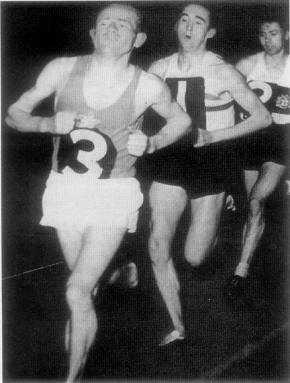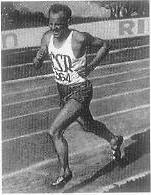Mystery and Excellence on The Human Body - Running - Zatopek

Emil Zatopek (left), the "Czech Express"
Running
II — Zatopek
Zatopek had first realized his own potential in 1941, when he was nineteen, and he had improved steadily but unspectacularly at 800 and 1500 metres until 1945, when the great Swedish middle-distance runner Arne Anderson paid a short visit to Prague. Andersen's physical condition, and the quality of his background work, transformed Zatopek's own training. He added quality to the quantity he had already established, and blended both with the extraordinary determination he had acquired for stretching his own body to the utmost whether in a race or a training session. Even on army sentry duty he might spend an hour running on the spot, knees high, shoulders straight, loading ever more stamina into the training bank. He trained, in those years of his mid-twenties, harder than any athlete had ever trained before. In the winter, when by unwritten law no-one trained hard, he put on heavy baseball shoes, or even army boots, and ran through the snow-covered forests — fast quarter or half-miles with short intervals of jogging between, bounding sometimes in long, looping strides for half a mile at a stretch — observing all the time the effect the work was having on his body.
Coaches today would have channelled the work with far greater economy. They would have tempered the hard workouts with more relaxed sessions; they would have spent hours streamlining Zatopek's tortured, hunched style (a contemporary said he ran like a man who had just been stabbed in the" heart); they might even have made him run a little faster. But he had built for himself in these long hours of relent less self-punishment a capacity for sustained speed — over ten laps or twenty laps — that few runners in the world could match, and a reserve tank at the end of a race to allow him to run flat out for a lap. It was enough ammunition to beat the world.
He took on the best over the grey cinders of Wembley Stadium on the first day of athletics at the 1948 Games. In one of the few warm
days of that fortnight he ran the 10,000 metres field into the ground. The Finn Viljo Heino, world record holder and favorite for the title, ran with Zatopek's pace for half the race; then Zatopek surged for half a lap and opened up a gap of ten yards. Heino simply stopped. No-one else got within shouting distance of the Czech, and to the delighted chants of his compatriots in the crowd he won by three-quarters of a lap.
The next day he qualified in the heats of the 5000 metres for a final as strange as it was exciting. Again Zatopek commanded the leading bunch which soon reduced itself to three men — him, Reiff of Belgium, Slijkhuis of Holland. Three laps from the finish Reiff pounced, and opened up an apparently unassailable lead on Slijkhuis, with Zatopek, who appeared to have lost heart or concentration or perhaps just strength, in a hopeless position forty metres from the leader. So they stayed until the start of the final back straight when, with the race as good as over, all hell broke loose as Zatopek began his sprint.
Within seconds he had raced past the tiring Slijkhuis, and began to close on Reiff. As the final bend unfolded, with the whole crowd on their feet roaring, it suddenly began to look as if Reiff could lose. Ahead of Reiff, eighty yards away over the puddles and the squelchy cinders, was the tape; but his effort had come, with great courage, three laps before, and he was nearly spent. And behind him there was the lunatic sprinting. As the tape drew nearer, even above the yelling of the crowd he could hear the pattering, splashing danger of Zatopek. He dragged one last effort out of his legs, and the gold medal — Belgium's first ever Olympic track victory — was his. Five yards more, and it could have been a dead heat. Ten yards more and Zatopek would have won.
As it was, it was yet another in a whole succession of breathtaking Olympic 5000 metres finals, and for Zatopek and Gaston Reiff it was only another act in a long-running battle of wits that would reach an even more exciting climax in Helsinki four years later.
By 1952 Zatopek was no longer the raw Czech surprise he had been in 1948. He had broken world records almost at will, he had won the European 10,000 metres with ridiculous ease, and in the 5000 meters, before a disbelieving partisan crowd in Brussels, he had unleashed his famous last-lap sprint and left the local hero Reiff for dead. He was the undisputed master of distance running and yet now, at the age of thirty, he had suffered some unexpected defeats, and he was by no means undisputed favorite for Olympic gold medals — even at 10,000 metres.
Favorite or not, Zatopek's week in Helsinki remains the supreme feat in distance running history, at the Olympic Games or anywhere else. True to reputation, if not to current form, he won the 10,000 metres by the usual and tested expedient of systematically running the legs off the opposition — by running too fast for them, by surging whenever he thought fit, and by taking a further twenty metres from them in the last lap. He won by a good 100 metres, received his medal, and prepared for the 5000 metres.
He knew that by now, despite his capacity for successive fast laps, he was not really fast enough to break up a 5000 metre field — the German Herbert Shade would be able to lead the field just as quickly as he could; Reiff would be in the field again searching for revenge; and Zatopek could not be sure that his final weapon, his 400-metre charge after the bell, would be enough to outsprint the young British runners Chris Chataway and Gordon Pirie, who had taken to the distance with such success. At the bell, Reiff had faded out of contention and Zatopek was positioned perfectly, on the shoulder of Shade who had led virtually from the gun. Zatopek launched himself into the final lap as only he knew how — he kicked, laid back his head, and charged. The crowd roared, and he was away.
Then something happened to Zatopek which, literally, had never happened to him in a major race before. At the start of the back straight in the last lap three men sped past his right shoulder — the young Chataway, Herbert Shade, who by rights should now be struggling in the wake of the Zatopek acceleration, and the French-Algerian Alain Mimoun. With 300 metres to go he had been striding away from the field; with 250 metres to go he was a mere fourth, out of the medals, his tactics exposed.
He responded almost with desperation, but with just the glimmer of a realization, as they began to lean into the final bend, that all was not well with the men in front. Chataway, in the lead, was beginning to druggie, Mimoun was closing on Shade, who was in turn inching up to the elbow of the leader. Zatopek was on them like a lion. With 180 metres to go there were four men in a line across the track, and the one on the outside, out in lane three, head rolling, arms thrashing, red vest heaving with the effort, was moving the fastest of all. Chataway, exhausted, tripped on the concrete surround and fell. Mimoun and °hade fought against the numbing fatigue into the straight and towards
the tape. Ahead of them, his face a picture of agony mingled with power and pride, ran Zatopek, into the tape and through it — the greatest, most exciting victory of his career.
To say that after that triumph the marathon was a formality is unforgivably to devalue the marathon. Twenty-six miles and 385 yards can never be a formality, and Zatopek had never run that distance in com petition in his life.
But though he might not have known it, his preparation for the long track events had been ideal — the one-hundred-plus miles a week, the fast intervals and the long-striding would today be considered a hard but almost perfect regime for a marathon runner; in 1952 it was almost certainly a better preparation than even Jim Peters — hot favorite for the Olympic title — had undergone.
In the event Zatopek stayed with Peters and with Jansson of Sweden for the early part of the race, and then is supposed to have asked (partly, one would imagine, as a stroke of devastating gamesmanship, and partly out of a genuine desire for information) whether or not 'we ought to be going faster?' Getting no cogent answer from Peters or Jansson, who were understandably quite happy not to go any faster, Zatopek left them, accelerated away and arrived at the finish with a little over two-and-a-half minutes to spare, tiring, it is true, but tiring less then the men behind him. The ovation that greeted him as he arrived at the stadium, from a Finnish crowd for whom distance running was meat, drink and mother's milk, bore witness to the magnificence of his triumph. It would need a giant to step into his shoes....
From Sebastian COE, The Olympians,
in the chapter "The limits of endurance"
|
Emil Zatopek in 1948 |
 |
Related Books
- Alexander the Great
- Arguments for The Existence of God
- But it is done
- Catherine The Great
- Danton
- Episodes from Raghuvamsham of Kalidasa
- Gods and The World
- Homer and The Iliad - Sri Aurobindo and Ilion
- Indian Institute of Teacher Education
- Joan of Arc
- Lenin
- Leonardo Da Vinci
- Lincoln Idealist and Pragmatist
- Marie Sklodowska Curie
- Mystery and Excellence on The Human Body
- Nachiketas
- Nala and Damayanti
- Napoleon
- Parvati's Tapasya
- Science and Spirituality
- Socrates
- Sri Krishna in Brindavan
- Sri Rama
- Svapnavasavadattam
- Taittiriya Upanishad
- The Aim of Life
- The Crucifixion
- The Good Teacher and The Good Pupil
- The Power of Love
- The Siege of Troy
- Uniting Men - Jean Monnet